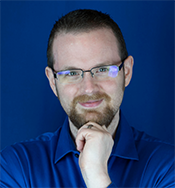Potter, David

David Potter is the Associate Professor and Coordinator of Music Education at the University of Wisconsin-Superior, where he serves as founder, director, and teacher of early childhood classes at the University of Wisconsin-Superior Community Music School, and teaches university courses focusing on elementary/secondary general music, ear training, and songwriting. He received his B.M. in music education from the Eastman School of Music, where he studied with Christopher Azzara and Richard Grunow. He also received an M.M. in music education from the Crane School of Music and a PhD in music education from Michigan State University, where he studied with Cynthia Crump Taggart. As a UWS faculty member, he received the Community Engagement Award and the Rising Star Award. Prior to teaching at UWS, he taught courses in songwriting and methods and materials of elementary music at MSU and received the David J. Teachout Graduate Student Scholarship from the Society for Music Teacher Education. He has taught elementary and early childhood music in New York, Pennsylvania, Tennessee, Michigan, and Wisconsin. In 2016, he received the Tennessee Music Education Association Outstanding Young Music Educator Award.
Potter’s work has been published in Bulletin of the Council for Research in Music Education, Arts Education Policy Review, and numerous state and regional music education journals. He has served as president of the Wisconsin Society for Music Teacher Education, on the editorial board for Arts Education Policy Review, and as an active member of the Gordon Institute for Music Learning. He is also an active clinician and presenter.
Workshops
Learning to Improvise: Readiness and Harmonic Audiation - Music Education
In this workshop, we will explore a roadmap for general music and choral teachers who are striving to help their students learn to audiate harmonically and express their own ideas through improvisation. Participants will engage in carefully sourced lesson plans rooted in the sequential model (resting tone audiation, chord roots by rote and audiation, harmonic audiation, and improvising over harmonies, then chord roots), its application to major and minor tonality with tonic and dominant functions, the addition of subdominant functions, and supplemental materials, including harmonic tapestries and folk/popular music.
Learning to Improvise with Popular Music - Music Education
This workshop is dedicated to the importance of popular music in the lives of students and how it can be used in the learning of improvisation to bridge the gaps between classroom music and the music that students encounter in their daily lives. Participants will engage in lesson plans rooted in the sequential model using pop songs ranging from the 1950s to the 2020s.
Learning to Improvise using Harmonic Tapestries - Music Education
In this workshop, we will explore the beauty of ostinati in learning to improvise vocally. Participants will engage with harmonic tapestries, how they serve as backgrounds for improvisation, and how individuals can improvise vocally over the tapestries, “embroidering” their improvisations into the soundscapes. Designed for choral music teachers, general music teachers, and anyone seeking to develop their own improvisation skills, participants will improvise in a "safe" setting and gain practical ideas for how to engage their students in successful vocal improvisation.
Choosing Repertoire for Use in Your Music Classroom - Music Education
In this workshop, we will explore the process of and criteria for selecting repertoire for use in your music classroom. Participants will learn how to explore the origins of songs, such as who wrote the piece, who transmitted the piece across time and space, and how people have used the piece in society. They also will grapple with the ideas of cultural appropriation, representation, and gendered language. This session is a powerful reminder that, as we engage in music teaching and learning, the content of what we teach can have a powerful impact on the experiences of our students.
